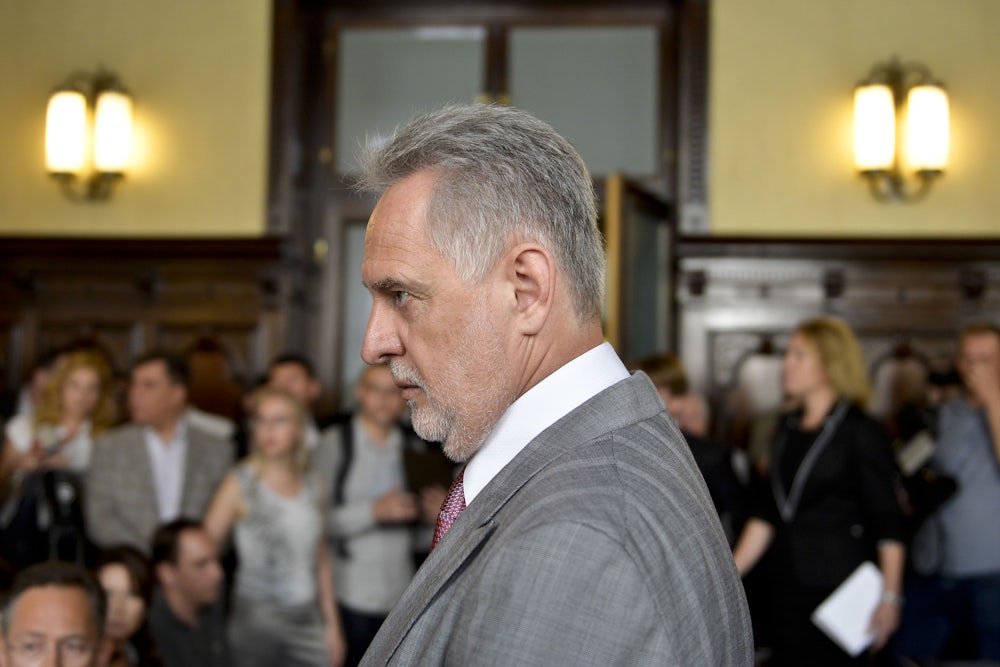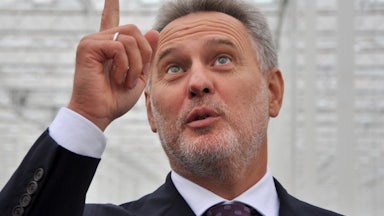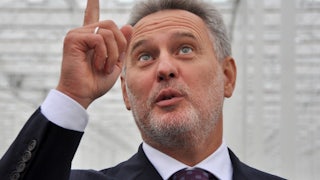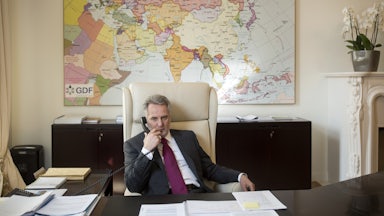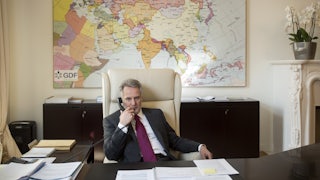For the past few years, as Rudy Giuliani gallivanted around the world looking for any kind of conspiracy that could help then-President Donald Trump remain in office, one question hung over Giuliani’s rambles: Who actually paid for his travels?
Thanks to a report in this week’s New York Times, we have a better idea. Giuliani’s paymaster wasn’t his client, nor was it any of the other Americans in the conspiratorial cabal working to help Trump steal the 2020 election. Instead, Rudy’s benefactor was the pro-Putin oligarch who stood at the center of Trump’s first impeachment—and who arguably stood to gain most by Trump retaining the White House: Dmitro Firtash.
As the Times reported, text messages and interviews revealed that the company overseen by Firtash—a Ukrainian kleptocrat currently awaiting extradition to the U.S. on bribery-related charges—footed the bill for much of Giuliani’s travels. Not only did Firtash’s company pay for Giuliani’s stay in at least one luxury hotel, but it paid tens of thousands of dollars for Giuliani’s flights around the world, including one trip on a private jet that cost a staggering $36,000.
At a minimum, these revelations confirm what was long suspected: A post-Soviet oligarch connected to multiple members of Giuliani’s team was also financing his travels. And it looks like Giuliani was able to obtain Firtash’s scratch with relative ease—a single text message would often do the trick. “Running into money difficulties on trip to London,” Giuliani wrote to Firtash’s translator, referring to an upcoming meeting with the oligarch’s associates. Voilà, private planes and luxury hotels were at Giuliani’s disposal in short order.
The news that an oligarch wanted in the U.S. for various and sundry crimes was secretly funding the American president’s lawyer would, in a perfect world, be a scandal unto itself. But the revelations regarding Giuliani and Firtash—an “upper-echelon [associate] of Russian organized crime,” per the DOJ, and a Putin ally to boot—go much further than Gulfstreams and gilded hotels, and point directly to just how open, and corruptible, the Trump White House was.
It also points right back to Trump’s first impeachment. Giuliani, after all, wasn’t simply traveling on Firtash’s dime to simply add some exotic names to his baggage claims. He was hard on the hunt for supposed “dirt” on then-candidate Joe Biden, which Firtash’s allies were only too happy to provide. Not only were Firtash’s American lawyers—Victoria Toensing and Joe diGenova, a pair of far-right conspiracy theorists moonlighting as attorneys—central to peddling fabricated scandals about Biden, laundering it through right-wing media figures like John Solomon, but they even managed to push such messaging to Attorney General Bill Barr directly. Trump, of course, happily amplified the rhetoric—and then threatened Ukrainian President Volodomyr Zelensky, saying that he’d withhold American military aid unless Kyiv endorsed the allegations by launching an investigation.
The conspiracies reached their intended target: the American president. And just like that, Trump was trading American foreign policy—and American national security—for personal, political gain. He pursued a conspiracy, and threatened a prone American ally, in the name of a conspiracy theory.
Trump’s first impeachment—which now seems quaint compared to the January 6 horror show that necessitated his second one—ended up being the fruits of these ill-intended labors. But amid the tangle of names and conversations, meetings and conspiracies, one figure always hung in the background, just outside the frame: Firtash. There was Firtash hiring Toensing and diGenova, who played a central role in injecting the so-called “dirt” on Biden into the broader news cycle. There was Firtash paying a staggering $1 million to Giuliani bagman Lev Parnas for supposed translation work. (“I’m the best-paid interpreter in the world,” Parnas would later say.) There was Firtash realizing that a second term for Trump was his best chance of escaping his impending extradition to the U.S. And, as we now know, there was Firtash giving tens of thousands of dollars in travel funds to Giuliani, the man who had direct access to the sitting American president.
It’s still easy to get lost in the tawdry morass of details surrounding Trump, Giuliani, Ukraine, and that first impeachment. But there’s a simple story at its core: A pro-Kremlin oligarch, facing the possibility of being extradited to the U.S. to face a trial for his criminal misdeeds, bankrolled an effort to trump up a scandal on Trump’s opponent—all in the hopes of keeping a thankful (and corrupted) president in power, the better to get his charges lifted.
Both Firtash and Giuliani deny that this was the intent of any of this financing. “Giuliani had no idea that Firtash was paying for those trips,” Giuliani’s lawyer told the Times, with Firtash’s representative blaming “an inadvertent error” on the financing scheme. Those assertions are about as plausible as Putin’s claims that he invaded Ukraine simply to protect ethnic Russians—or, for that matter, Trump’s claims that the 2020 election was stolen from him.
Of course, Firtash’s and Giuliani’s efforts eventually fell apart. The oligarch continues to await extradition to the U.S.—one reason he’s recently tried to run a new con, in which he’s transformed himself into a supposedly pro-Ukrainian patriot. Giuliani’s at least a bit more fortunate, insofar as the investigation into his unregistered foreign lobbying work appears to be winding down without any charges (though he still faces a mountain of evidence regarding his efforts to overturn the 2020 presidential election). And given the new revelations regarding Firtash’s financing of Giuliani’s travel, the likelihood of the two of them linking up again in the future remains negligible.
But the playbook Firtash created will long outlive him, and will persist beyond these revelations. As Firtash illustrated, if you’re an oligarch who ends up in trouble for kleptocratic crimes, you should hire pro-administration figures and claim to have knowledge of “dirt” on a political opponent, regardless of its accuracy or provenance. You should then dangle that information in exchange for lifting American investigations and American charges—and wait for the Americans like Giuliani to come calling.
It was a playbook that revealed just how susceptible the U.S. remains for foreign kleptocratic forces. It was also a move that was completely unprecedented in American history. Some have dubbed it “strategic corruption,” highlighting how these oligarchs and dictatorships use corrupt networks to access and undermine democracy. But there’s another, more colloquial name that fits even better. It’s a name that points directly to the kleptocrat who perfected it, and who bankrolled it, and who nearly got away with it. Just call it the Firtash Model.
